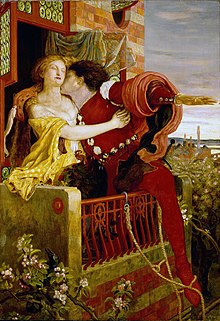
Back رومانسية (حب) Arabic رومانسيه ARZ Amor románticu AST Romantik sevgi Azerbaijani Romantikong relasyon BCL Рамантычнае каханне Byelorussian Романс Bulgarian প্রেম Bengali/Bangla Romansa (ljubav) BS Amor romàntic Catalan
This article is written like a personal reflection, personal essay, or argumentative essay that states a Wikipedia editor's personal feelings or presents an original argument about a topic. (July 2018) |
This article possibly contains original research. (January 2018) |

| Part of a series on |
| Love |
|---|
Relationships (Outline) |
|---|
Romance or romantic love is a feeling of love for, or a strong attraction towards another person,[1] and the courtship behaviors undertaken by an individual to express those overall feelings and resultant emotions.[2][3]
The Wiley Blackwell Encyclopedia of Family Studies states that "Romantic love, based on the model of mutual attraction and on a connection between two people that bonds them as a couple, creates the conditions for overturning the model of family and marriage that it engenders."[4] This indicates that romantic love can be the founding of attraction between two people. This term was primarily used by the "western countries after the 1800s were socialized into, love is the necessary prerequisite for starting an intimate relationship and represents the foundation on which to build the next steps in a family."
Alternatively, Collins Dictionary describes romantic love as "an intensity and idealization of a love relationship, in which the other is imbued with extraordinary virtue, beauty, etc., so that the relationship overrides all other considerations, including material ones."[5]
Although the emotions and sensations of romantic love are widely associated with sexual attraction, they could also exist without sexual attraction. In certain cases, romance could even be interpreted as a normal friendship. Historically, the term romance originates with the medieval ideal of chivalry as set out in the literature of chivalric romance.
People who experience little to no romantic attraction are referred to as aromantic.
- ^ Gottschall, Jonathan (2008). "Romantic Love: A Literary Universal?". Literature, Science, and a New Humanities. New York: Palgrave Macmillan US. pp. 157–170. doi:10.1057/9780230615595_8. ISBN 978-0-230-60903-7. S2CID 144997784.
to experience a strong desire for union with someone who is deemed entirely unique.
- ^ Smith, Dana G. (February 13, 2024). "What New Love Does to Your Brain - Roses are red, violets are blue. Romance can really mess with you". The New York Times. Archived from the original on February 13, 2024. Retrieved February 14, 2024.
- ^ McGill, Bridgett; Dunn, Steven M. (2023). "Romance". Encyclopedia of Sexual Psychology and Behavior. Springer, Cham. pp. 1–4. doi:10.1007/978-3-031-08956-5_353-1. ISBN 978-3-031-08956-5.
- ^ Arosio, Laura (2016). "Romantic Love". Encyclopedia of Family Studies: 1–3. doi:10.1002/9781119085621.wbefs281. ISBN 978-1-119-08562-1.
- ^ de Jong, Michelle; Collins, Anthony (2017). "Love and looks: A discourse of romantic love and consumer culture". Acta Academica. 49 (1). doi:10.18820/24150479/aa49i1.5.
